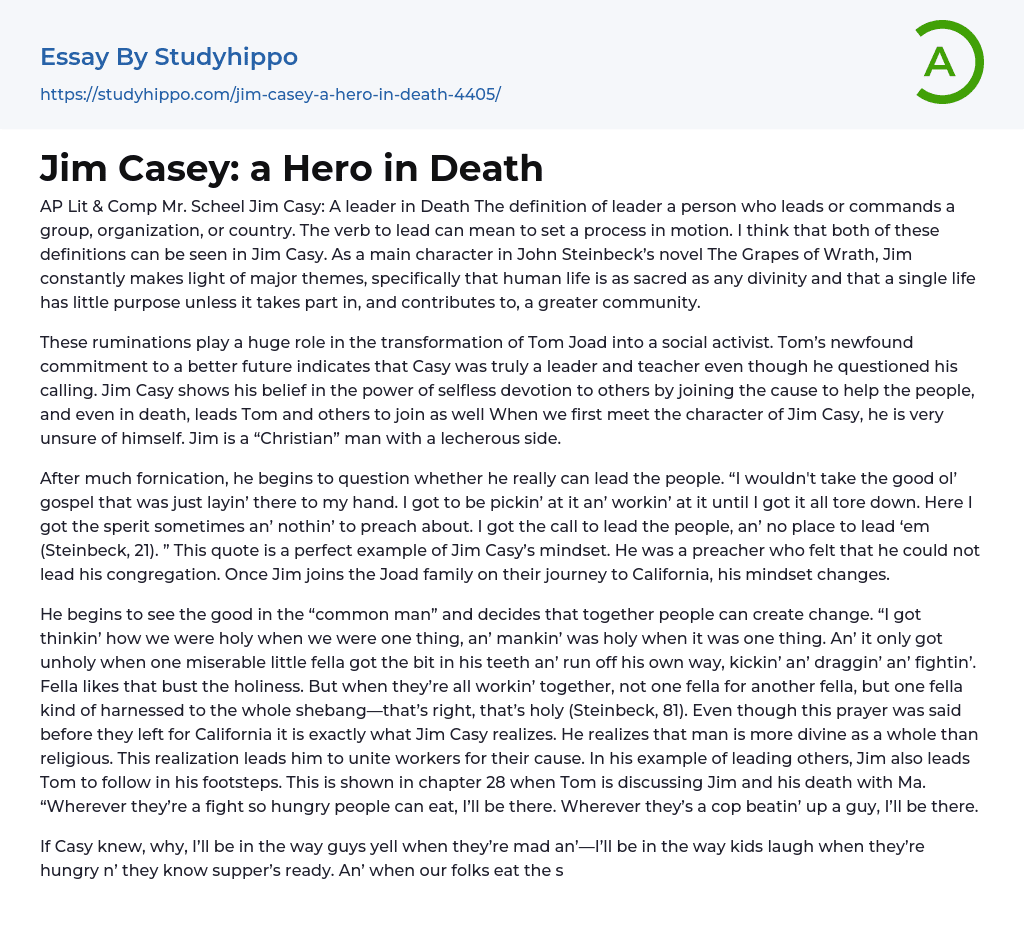AP Lit & Comp Mr. Scheel Jim Casy: A leader in Death The definition of leader a person who leads or commands a group, organization, or country. The verb to lead can mean to set a process in motion. I think that both of these definitions can be seen in Jim Casy. As a main character in John Steinbeck’s novel The Grapes of Wrath, Jim constantly makes light of major themes, specifically that human life is as sacred as any divinity and that a single life has little purpose unless it takes part in, and contributes to, a greater community.
These ruminations play a huge role in the transformation of Tom Joad into a social activist. Tom’s newfound commitment to a better future indicates that Casy was truly a leader and teacher even though he
...questioned his calling. Jim Casy shows his belief in the power of selfless devotion to others by joining the cause to help the people, and even in death, leads Tom and others to join as well When we first meet the character of Jim Casy, he is very unsure of himself. Jim is a “Christian” man with a lecherous side.
After much fornication, he begins to question whether he really can lead the people. “I wouldn't take the good ol’ gospel that was just layin’ there to my hand. I got to be pickin’ at it an’ workin’ at it until I got it all tore down. Here I got the sperit sometimes an’ nothin’ to preach about. I got the call to lead the people, an’ no place to lead ‘em (Steinbeck, 21). ” This quote is a perfect example o
Jim Casy’s mindset. He was a preacher who felt that he could not lead his congregation. Once Jim joins the Joad family on their journey to California, his mindset changes.
He begins to see the good in the “common man” and decides that together people can create change. “I got thinkin’ how we were holy when we were one thing, an’ mankin’ was holy when it was one thing. An’ it only got unholy when one miserable little fella got the bit in his teeth an’ run off his own way, kickin’ an’ draggin’ an’ fightin’. Fella likes that bust the holiness. But when they’re all workin’ together, not one fella for another fella, but one fella kind of harnessed to the whole shebang—that’s right, that’s holy (Steinbeck, 81). Even though this prayer was said before they left for California it is exactly what Jim Casy realizes. He realizes that man is more divine as a whole than religious. This realization leads him to unite workers for their cause. In his example of leading others, Jim also leads Tom to follow in his footsteps. This is shown in chapter 28 when Tom is discussing Jim and his death with Ma. “Wherever they’re a fight so hungry people can eat, I’ll be there. Wherever they’s a cop beatin’ up a guy, I’ll be there.
If Casy knew, why, I’ll be in the way guys yell when they’re mad an’—I’ll be in the way kids laugh when they’re hungry n’ they know supper’s ready. An’ when our folks eat the stuff they raise an’ live in the houses they build—why, I’ll be there. See? God, I’m talkin’ like Casy.
Comes of thinkin’ about him so much. Seems like I can see him sometimes” (Steinbeck, 419). This change in Tom was also noted by Robert DeMott in the introduction to The Grapes Of Wrath, where he states “Tom is indebted to ex-preacher Casy for guiding him toward social awareness and political action. This only further proves that Jim Casy did in fact lead people to find their fate. Although Jim Casy begins the novel questioning whether or not he can lead, throughout the course of the novel he finds that it truly is his calling. Tom Joad follows Casy’s example, giving the reader the satisfaction of knowing that Jim’s death was not in vain. It also gives the reader comfort in knowing that even in death, Jim Casy was an influential character.
Works Cited
- Steinbeck, John. The Grapes of Wrath. New York: Penguin, 2006.
- Leader essays
- Biography essays
- Power essays
- Superhero essays
- Mission essays
- Purpose essays
- Helping Others essays
- Actions essays
- Book Summary essays
- Metaphor essays
- Reader essays
- Rhyme essays
- Literary devices essays
- Villain essays
- Books essays
- Genre essays
- Literary Criticism essays
- Writer essays
- Protagonist essays
- Simile essays
- Poem essays
- Book Report essays
- Book Review essays
- Greek Mythology essays
- Plot essays
- Tragic Hero essays
- Coming of Age essays
- Play essays
- Rhetoric essays
- Rhetorical Question essays
- Translation essays
- Understanding essays
- Reason essays
- Character essays
- Letter essays
- American Literature essays
- Literature Review essays
- Utopia essays
- Poetry Analysis essays
- Dante's Inferno essays
- Between The World and Me essays
- Incidents in The Life of a Slave Girl essays
- Flowers for Algernon essays
- Myth essays
- Everyday Use essays
- Boo Radley essays
- Genesis essays
- Richard iii essays
- Alice in Wonderland essays
- On the road essays




